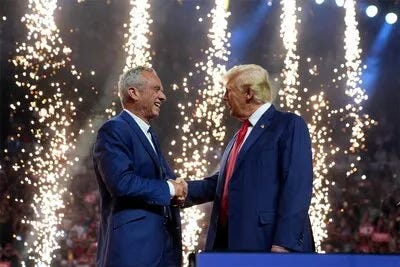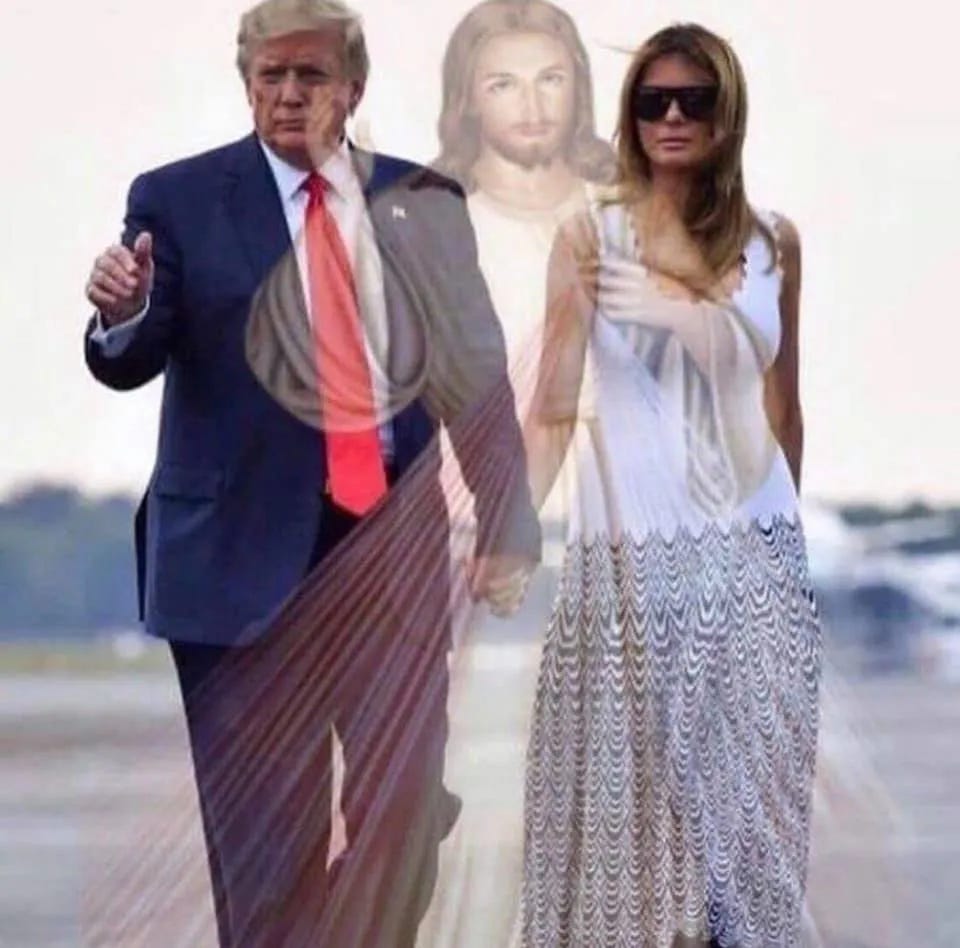It's Time For A New American Narrative
The narratives that arose in the aftermath of World War II have fueled American identity and patriotism for multiple generations. But that era is passing away. What does it all mean?
Every nation has a founding myth—a set of ideas and interpretation of events that unite them as a people. A belief in these ideals are what unites a populace, inspires them to love their homeland and, when necessary, take up arms to defend it.
We should note that, while the phrase “national myth” is commonly used, they aren’t necessarily myths in the literal sense. The narratives that people believe may or not be true. I would argue that the most general tendency is for basic truths to be at the core of these narratives, and then myths to gradually surround them.
It’s the responsibility of historians to always revisit and unpack these myths and to ask hard questions. What is true and what’s on a par with myths like Santa Claus, the Easter Bunny, and the reliability of Anthony Fauci? When something is verified to be true, is it being properly interpreted and applied in our own day? For that matter, is it even relevant?
Those are questions I have about the narrative that is, while not necessarily the “founding myth” of the United States, is at least the narrative that has fueled several generations of American patriotism—the narratives of World War II and the Cold War.
The Basic American Narrative of the Postwar Era
Generations of schoolchildren, going back to the 1950s, were brought up on these basic premises:
*That the United States saved the world by intervening in Europe and defeating Adolph Hitler.
*That the United States further saved the world by defeating Emperor Hirohito and Japan in the Pacific War
*That the United States then pivoted and won a long drawn-out Cold War with the Soviet Union, saving the world from Communist domination.
Do you accept these premises? If you put them to me on a Yes or No vote, I’d vote “Yes.” While there is a messianic quality to the narrative that makes me a little uncomfortable and raises questions of its own, I believe not just the United States, but the entire world is better off because the U.S. and Allied forces triumphed in Europe and the Pacific, and that the Soviet Union collapsed 44 years later, I have no problem with signing on to that basic notion.
I would further assent to the proposition that the generation that achieved all this deserves the label “The Greatest Generation”, something further supported by the fact that this was the generation (not the flower children that followed them) who defeated racial segregation in the United States—the landmark 1964 Civil Rights Act was signed well before campus protests came into vogue.
So, what’s the point of this article then? Did I fill your inbox in the middle of a busy week just to restate what 90 percent (at least) of this subscriber base probably already believes? No.
What I really want to do is get at some issues and questions surrounding this narrative that I think are particularly timely to this hour in human history.
The End of The Era
The most basic issue is this—the era that this Narrative defined is over. Or, at the very least, it’s in its death throes. It’s not anyone’s fault, it’s just the way it is. History pivots. Epochs end and begin anew. We are at this threshold place right now.
The consequence is that attempting to react to ongoing events based on the old Narrative is going to be increasingly fruitless and frustrating. If you’re an actual policymaker, it will cause serious harm.
I discuss the Russia-Ukraine War a lot in this space and it’s because I think that nowhere is this tension between a dying Narrative and an emerging era more apparent than in the debate that surrounds this subject.
On the one hand, you have most of West’s political leadership trying desperately to hold on to power, invoking the memories of Adolph Hitler marching across Europe, warning of appeasement, and proclaiming Zelensky to be the next Churchill, citing the memory of Ronald Reagan and seemingly oblivious to the dangers of nuclear war.
On the other hand, you have an emerging coalition of countries, headlined by Russia and China, forging their own new order as they watch the West, crumbling due to spiraling debt, massive illegal immigration and a deep moral confusion that has substantial chunks of their populations unable to differentiate between a man and a woman.
Within the United States, the congressional leadership of both parties and every major corporate media platform is firmly aligned with holding on to the Old Narrative. They can’t be persuaded, because they are benefiting from the order built around that Narrative.
Part of their political support comes not from people agreeing with them, but because there are millions of people (74 million or so, to judge from the last election) who reduce everything to their personal disdain for one real estate developer from New York. And if he takes steps to adjust to the new era (i.e., acknowledging Russia has won the Ukraine war), they’re going to oppose it. Even if it means letting a dangerous war risk nuclear escalation.
There’s not much you can do about that. Political leadership, media, and key institutions, take their positions because it’s in their financial interest. A certain part of the U.S. electorate does so to appease their emotions. You can’t fix greed and hate in someone else. You can only root it out in yourself and then deal with the situation as it exists.
Where my interest lies is with another substantial part of the electorate that, based on their reaction to the Russia-Ukraine situation (specifically, by how the late February dustup between Trump and Zelensky in the Oval Office was reacted to), is still stuck in the old order, but isn’t financially benefitting from it, nor do they have a deranged dislike of the current U.S. president—in fact, most, if not all, voted for him.
Yet they still react viscerally and passionately to any rapprochement between the United States and Russia or any acknowledgement of U.S. defeat. They certainly recoil at any suggestion at all that the United States and the collective West may bear responsibility for provoking this war to begin with. Even though the empirical evidence supporting the latter is overwhelming.
Why? I believe they’re living in a world that either no longer exists or is at least dying. A pivot has to be made. The era that was built around the old Narrative is over. The consequences of living in an outdated mental and psychological framework include agitation and misunderstanding.
Unpacking the Old Era
There are a lot of questions that need to be asked about the old era and its Narratives. While I accept the basics, I still think there’s a lot of questions that need to be asked. Foremost among them is this—as a nation should we really be glorifying a period of history that was effectively ushered in when the U.S. dropped an atomic weapon on civilian populations to end World War II? It was a grotesque violation of time-honored Christian teaching, going as far back as St. Augustine, about never deliberately targeting civilians.
Furthermore, this unprecedented human rights violation was sold to the American public as being the only way to avoid a large-scale and bloody invasion of the Japanese mainland. Of course, the problem is that the greatest military minds of World War II, including Dwight D. Eisenhower and Douglas MacArthur did not share that view. But that can be a subject for another time. Personally, I think the invasion/A-Bomb choice that was sold to people will go down as the first “Deep State” lie of the era.
The New Narrative
As documents are declassified, from JFK to RFK to MLK, and more, we’re going to learn more and more about the era that is passing away. To the extent we take that opportunity, letting old narratives pass away and new ones take their place, will define our national future.
What should replace the old narrative? We’re in an embryonic stage, but I would submit this—our political life right now is about one outsider trying to make the peace and pivot, going up against a completely entrenched establishment in the government and media, with a vested interest in maxing every last dollar out of the old narrative. One political outsider who improbably became the voice for those who had been discarded by the current political establishment, and who brought together an unlikely group of allies to help.
How that should be worded, I’m not sure, but I think these images are a good starting point:
****************************************
SUPPORT CORNED BEEF CATHOLICISM
If you like the content here, the best way to help is to share and forward with like-minded people (and even a friendly adversary if they’re open-minded)
*Second, encourage people to subscribe. Our subscriptions here are free, so there’s no content behind a paywall.
I wrote a novel back in 2003 that was set in a fictional Irish Catholic neighborhood in postwar Boston. It’s still online at Amazon, in both print and electronic formats. The novel celebrates Catholic teaching, old-school populist politics (in an era when the Democratic Party was home to my kind of voter), the Boston Red Sox and Notre Dame football. In the worlds of faith, sports, and politics, it captures what I believe.
You can buy the book here:
I’ve also set up a “tip jar” over at the website Buy Me a Coffee. If you find an article or video particularly informative or enjoyable, you can leave an electronic tip.
Finally, while I’ve gotten active in politics because events of the last five years have shown that we have to protect ourselves, my first interest remains sports. I’ve got a nostalgia website, OUAT Sports, which is regularly updated with historical articles and includes a blog on current games. If you or someone you love is a sports fan, bookmark the site, and sign up for the free Substack associated with it












